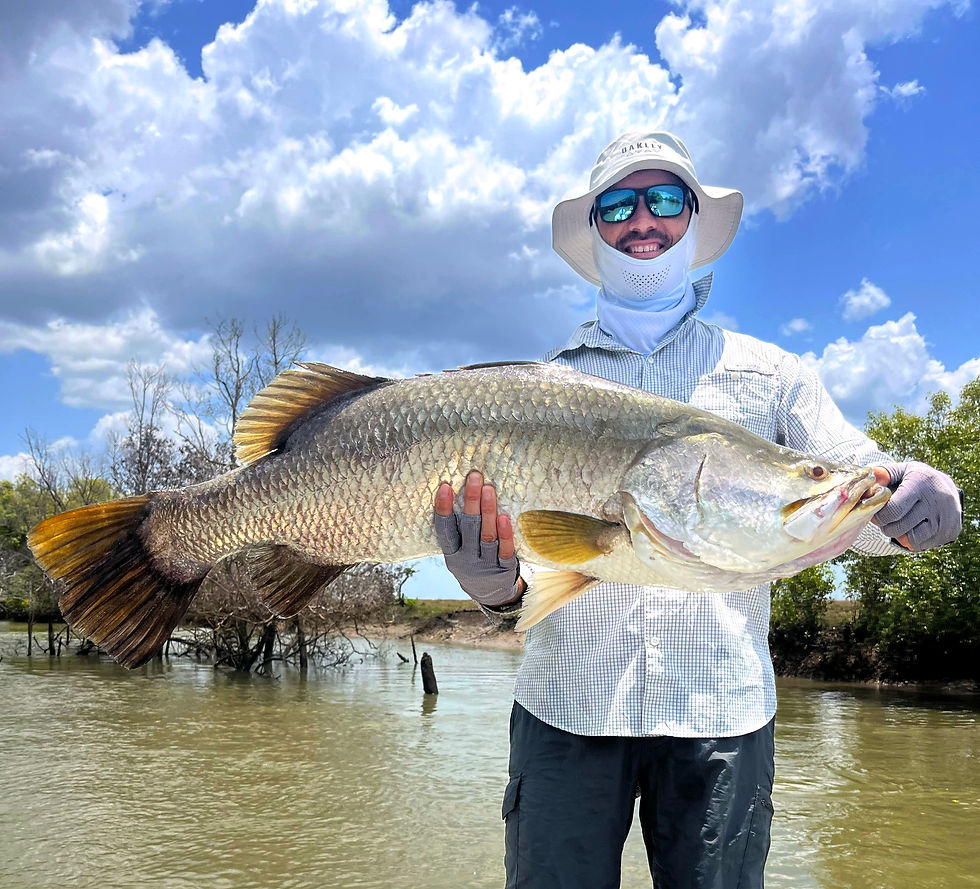Alex's Column 30 October 2025
- Nov 5, 2025
- 3 min read
With October nearly over, I’m pleased to report that it’s been a pretty good Build-up
month as far as our expectations go for the coming Wet season.
It’s also been warmer than average.
The Build-up this year has been characterised by some good storms, particularly to the
west of Darwin, but also on the floodplains east to Kakadu.
That explains why some billabongs have poor water clarity.
It’s ironic that, as both the air and water heat up towards the end of the year, and the
barra in the lagoons become more active as they anticipate the coming Wet season
floods, the arrival of rain can actually send the barra into a docile mode.
When the first storm of the year delivers a wet blow to an inland lagoon, the various
water layers often begin to churn and mix with each other.
The top layer near the surface is where most of the oxygen is during the hotter Build-up
months, which is why surface popper fishing, particularly at night, can be so good at this
time.
However, once that oxygen is mixed and spread from top to bottom, the barra can
struggle for air.
The best-case scenario is that they simply become sluggish and lose their appetite; the
worst-case scenario is a major fish kill!
A good example of the former is what happens every year at Yellow Water lagoon at the
top of the South Alligator River chain in Kakadu.
There’s quite a lot of shallow water in the famous lagoon, so it gets pretty hot in
November/December, and it’s normal to see barra swimming lethargically along the
grass beds, and sometimes a sickly pale colour.
Mostly, these fish will not touch your lure offering because they are just too damn sick.
Once solid rains come – raising water levels and igniting flow through the lagoon – the
barra recuperate quickly.
I haven’t heard of any major fish kills so far this year.
It’s important that, if you come across a fish kill, you report it immediately to NT Fisheries
Research so the scientists can get to the scene while the carcases are still fresh or the
fish are still dying, and accurate tests can be made on the condition of the water.
Although some lagoons have gone quiet for the time being, the storm activity of late has
actually fired life into the saltwater estuaries where daily tides quickly move any
freshwater runoff out of the system.
The tides are neaps this weekend, which is fine for most Top End saltwater barra fishing
locations.
The excellent water clarity will be ideal for chasing a big barra in places like the Shoal
Bay system and in and around the mouth of the Adelaide River.
The really good news is that offshore conditions are predicted to be perfect this Saturday
and almost as good on Sunday.
Ex Darwin, on the pelagic scene, therefore, you can take your pick from jigging mackerel
at Bass Reef, to skipping baits for the sailfish wide of Dundee, or to churning poppers
across the shallows for GTs and queenfish up the Melville coast.
Bottom bouncing will probably be a bit tougher with such minimal tidal movement, but
those morning lows are specials for black jew on the offshore artificial reefs.
Worth noting for this weekend is the final round of the 2025 Top End Barra Series which
will be held on the lower Adelaide River and across to Leaders Creek, including
Saltwater Arm.
It’s going to be a tight finish this year, and the Adelaide venue is just the location to
throw up some nice big point-scoring barra.
Good luck to all the TEBS competitors.



